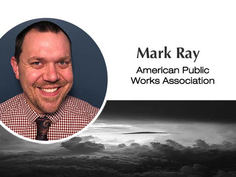Latest News
The Health of Communities Depends on Public Works

Essential public services are what makes stay-at-home orders possible and safe during times of crisis
By Mark Ray
While we are far from knowing the full scope and impacts of COVID-19 on our cities, states, and nation, these past few months have really highlighted the important role public works has in supporting public health. As of the time of this writing, over 90% of the population in the United States is under a stay-at-home order. Staying at home would not even be possible without public works, which at the most basic level is providing a transportation network allowing for the movement of food and other commodities. Clearly, the most relevant role public works has in supporting the public health of higher density environments is providing safe and reliable water for personal hygiene and cooking, among other uses. Beyond transportation and water, other ways public works operations are critical in public health include the design, construction, operation, and maintenance of infrastructure that provide for:
- Wastewater collection and treatment
- Solid waste (trash) collection and disposal
- Stormwater management
- Public facility management
- Equipment/fleet maintenance and operations (which can include police, fire, EMS beyond public works)
On a softer side, parks and recreation facility operations are important for community health. With people self-quarantining and providing social separation, the park systems are providing a convenient location for people to get outside, exercise, get fresh air, and see neighbors (at a safe distance). Keeping these spaces welcoming and appealing not only supports mental health, but can also promote a sense of community pride in the common cause. That said, the safety of employees and vendors/ suppliers needs to be taken into consideration when evaluating what recreation services to provide.
While public works professionals will continue to provide these essential services, we also need to be protecting our staff. Operational changes can include having as many staff as feasible working remotely, changing schedules to separate staff, reducing or eliminating entering private properties for routine work; if you do have to enter a home, ask pre-screening questions; reviewing amount of PPE and other cleaning, sanitizing, laundry supplies and getting more if needed; moving as many meetings as feasible to a virtual environment, and cross-training staff to provide for additional redundancies. Facility changes can include hand sanitizer in locations where people transition between spaces and soap/water are not available; putting sanitizing wipes by computers and phones; installing hygienic door openers wherever feasible; not allowing non-essential vendors/salespeople/deliveries into facilities. For essential staff and vendors, use a pre-screening (thermometer, etc.) method of screening prior to entry.
In addition to providing for these essential critical infrastructure operations, it is vital that public works professionals also realize the role we have in preventing/minimizing disasters from cascading A great example of an action that can minimize cascading impacts is street sweeping to remove accumulated debris. Street sweeping does make the street look better, but more importantly, it removes the debris that may clog the stormwater system potentially causing localized flooding, or worse. Using high-pressure water nozzles to clear (jet) sanitary sewer mains is also important. With people flushing more than just toilet paper down the drain it is important to keep jetting so that sanitary sewer backups are minimized. With people trying to shelter-in-place, their shelter will be compromised by a sewer backup. But more than that, their options on where to go may be limited based on potential exposure to COVID-19. Maintaining a broad perspective of the potential impacts of not doing seemingly routine tasks cannot be lost to public works professionals during this crisis.
Public works professionals should be proud of carrying on their mission under challenging circumstances to serve their community. We should be under no illusion that the future weeks, and potentially months, will be any easier or that the challenges will lessen, but I am confident in our profession’s ability to adapt, improvise, and push forward to continue to provide essential public services. Public works makes normal happen, even if what is normal is evolving.
Mark Ray is the Public Works Director for the City of Crystal, MN, and serves as chair of the American Public Works Association’s Emergency Management Committee. Mark is a nationally recognized, award-winning Public Works Professional with leadership and management experience in both the public and private sectors.
What's New
-

Young Professionals Spotlight
March 25, 2024
-

APWA-MN Education Programs
March 25, 2024
-
Apply for the Young Professionals Stipend: Attend PWX Atlanta
February 23, 2024



